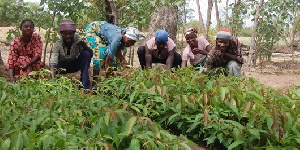 Some farmers are unhappy about government's approach toward the Planting for Food and Jobs program
Some farmers are unhappy about government's approach toward the Planting for Food and Jobs program
The Peasant Farmers Association of Ghana (PFAG) has expressed concern over delays associated with procurement and distribution of seeds and fertilizers, saying, the situation, if not checked, would negatively affect the Planting for Food and Jobs programme (PFJ).
The concern was raised at a press conference in Accra to present the Association’s analysis of the agricultural sector budget, as captured in the 2018 budget which was presented to Parliament last week.
Addressing the media at the event, Charles Nyaaba, Programme Officer for the association, noted that considering the target set by government last year, the 2017 performance of the PFJ programme is commendable, however, there are some challenges that need to be addressed for the initiative to succeed.
“We expect that the challenges associated with its implementation like late procurement, late payment of input suppliers, will be dealt with. If we are not able to address these constraints in 2018, it is likely to still affect the programme.
We expect early negotiations with suppliers of subsidised fertilizers and seeds to forestall delays and make it possible for inputs to be in stock in the regions and districts prior to the 2018 major planting season.”
The Planting for Food and Job initiative was introduced by government to help address the declining growth of Ghana’s agricultural sector.
The five-year long policy is geared towards increasing food productivity and ensure food security for the country as well as reduce food import bills, and also serve as an avenue to modernise agriculture and make it a source of employment for the teeming youth.
Among other things, the packages involved in the programme include the supply of improved seeds and fertilizers to farmers at subsidised prices (50% subsidy), and the provision of free extension services to farmers.
According to Mr. Nyaaba, over the years, the previous government which initiated the subsidised fertilizer initiative, failed to get fertilizer to farmers on time, hence affecting crop yield during harvesting.
He said: “For instance, farming season in the south starts between March and April but government starts the procurement around March. So, before the fertilizer will be ready for farmers to access, the farmer would have already planted his plants. And for some of the crops, you have to do the first fertilizer application, two weeks after planting seeds. But in most cases, the fertilizer comes when the plants are over a month, and when this happens, we do not get the full potentials of the fertilizer.”
He added that the case was not different this year, saying: “In 2017, farmers were ready to plant but they were waiting to get seeds and fertilizer from government, and so some farmers delayed planting and by the time the seeds came in, the planting season was almost over and it affected them badly.”
Aside delays in the procurement and supply of inputs, the association also noted its displeasure at the absence from the budget, any government policy geared towards enhancing local seed production in the country.
Mr. Nyaaba stated that more than 80 percent of seeds grown by farmers last year, were imported, urging government to pay particular attention to the area.
“When government initiated the PFJ programme we said that they needed to obtain seeds form our local seed growers, but because there has not been enough investment there, there were no seeds to be grown. So, they imported more than 80 percent of the seeds and some of these seeds are not conducive to the weather here.
When this government said they were focused on transforming agricultural sector, we were expecting to see huge investment in the local seed production, but we haven’t seen anything like that in the budget.
So, we think that instead of over relying on the importation of seeds, we should rather see how we can put these logistics together to empower our local seed growers,” he urged.